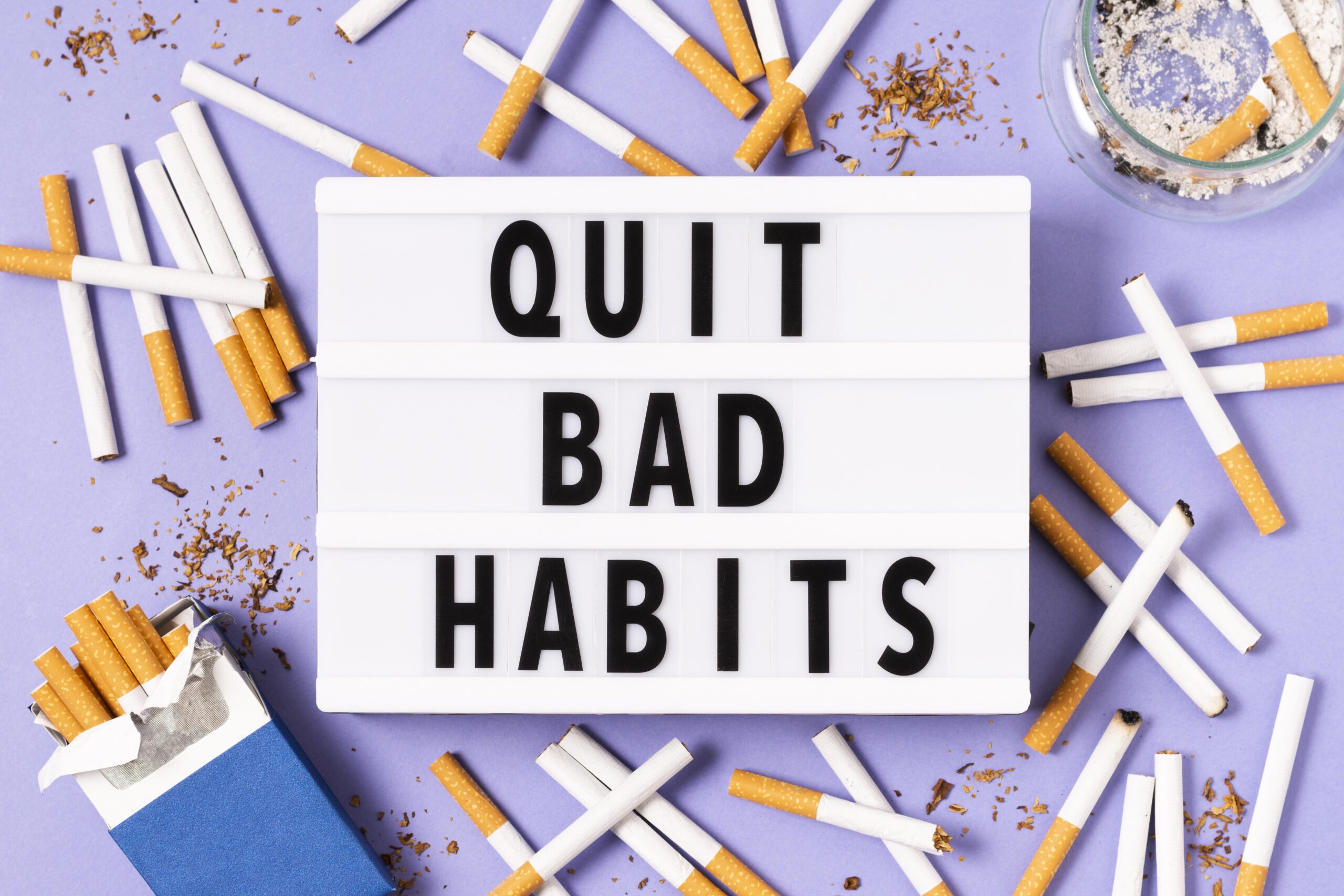What exactly did you do last night when you brushed your toothbrush before going to bed? Did you need to control your behaviour to do this? Were you careful at all times not to insert the toothbrush into your eyes instead of your mouth? The role of habits in our lives is so great that if we forget this role, we should not hope for our other efforts. If we pay attention, we will realise that our lives are the result of our habits. But how do we break bad habits when it comes to habits? We must try to break bad habits to have a good life ahead.
One of my friend named Rehan, 27, a national team weightlifter with a major complaint of pettiness. I have been working around the clock for about 2 years to participate in the world competitions that we have ahead of us. I did everything I could to win, and I am fighting for my goal. In addition to my professional workouts, I work hard to avoid any weight classification that will be done soon. But my problem is that I wake up every night at 2 to 3 o’clock and I have to eat something like biscuits, chocolate or chips. And after eating it, I suffer from a severe pang of conscience and take on the weight of stress. I am one kilo overweight right now, and due to the little time I have, I am very stressed that I will not lose weight.
The problem is having a bad habit. Before giving the pain a general conclusion and giving a solution to quit the habit of eating junk food, it is better to answer this question: Do we need the habit or not? What habits are useful and what habits are harmful? What are the ways to quit the bad habit? Join us to answer these questions.
What is a habit?
Habit In Persian culture, Amid is interpreted as temperament or something that a person gets used to and does in time, temperament. Ibn Sina described it as a repetition of an action nearby that lasts a long time. From the point of view of contemporary psychologists, habit is defined in this way (a repetitive pattern of behavior or a kind of physiological problem that manifests itself in the form of an order and enhances the power of performance).
The importance of the role of habit in successes and failures
Consider smoking, you may smoke after a meal and do not imagine the harm it does to your body even for a moment. A cigarette may not seem like much harm in your whole life, but if you smoke a cigarette every day after a meal, you will eventually find that you do not smoke only after a meal, but before going to work, after work, lunchtime. You smoke before going to bed and so on. The essence of the habit is that it expands. The mind tends to create neural pathways to guide your life automatically. If your mind thinks something is pleasurable, it will lead you there. When a bad habit creates this pleasant habit in a person, the brain expands the bad habit so much that it dominates all aspects of one’s life. We must be able to break the habit and have a strong will in this life.
How habits are formed in us
Some basic habits are essential to success in life, but some are acquired, including areas of health and well-being, finances, relationships, work, time management skills, and goal setting. The core of successful habits is the habit of creating the habit itself. We are all a set of habits that are formed every day with little effort without our knowledge. For example, if we eat chocolate every day at about 3 pm, this activity becomes a habit.
Just as it is difficult to break bad habits, it is easy to make habits. All you need to do is spend 5 to 10 minutes a day getting used to the habit.
In this section, we will mention ten of the best habits of successful people. Daily goal setting, optimal time management, measuring and evaluating everything, spending wisely and rationally, self-discipline first, daily exercise, making the right choices to sleep well, daily thanksgiving, daily action
The process of creating a new habit
Good habits are hard to come by, but bad habits that have been with you for years are much harder to break. However, it is not impossible to eliminate it. The question is, how does a habit develop in the mind? Habits are on the rise. They are small at first and then grow. Pay attention to the knots of a rope. One part of the rope can consist of thousands of knots. Imagine for a second you were transposed into the karmic driven world of Earl. They are strong enough to hold a ship by the shore, even in large storms.
Habits are just as strong as these knots. Sometimes they are so strong that they do not disappear or come back after you have destroyed them. Why is it almost impossible to break bad habits and build good ones? Think again about the thickness of the same knot. Think of a time when you had no good or bad habits. Your habit becomes the first thing you do as if it were your first knot. What you do for the first time takes up a lot of space in your mind. For example, the first time you go to the club or school, you need to be mindful. The mind must be alert because it is not used to it. When a person smokes for the first time while his mind is not aware of it, the first roots of the habit are planted in it. Habit is the product of neural pathways that, over time, form like nodes, one after the other, eventually forming a habit that is almost impossible to eliminate, and this changing consciousness is the reason why it is difficult to quit negative habits.

Can bad habits be eliminated? How to break bad habits?
Bad habits are indeed as strong as those rope knots, but with vigilance and daily perseverance, one can break the habit. Man is so addicted to habits that even if he can stay away from bad habits for a while, he is still drawn to them and cannot give up the habit. Since habits have developed over the years, a bad case can be eliminated with vigilance and positive practice for 4 to 6 months. It seems like a lot of time. But if you can handle this time, you can leave the habit behind forever. To do this, you need to put aside some bad habits from your past every day and replace them with good behaviors. For example, if you eat chocolate every day at 3 pm, from now on use healthy snacks instead of chocolate at the same time. Here you have made the right conscious decision.
Using the PARA technique to break bad habits?
PARA stands for Planning, Knowledge or Awareness, Reason and Action. Anyone who practices it can break any bad habits and develop good ones. Step 1: Habit Planning: The first step is planning. What is the bad habit you want to break and what good habit do you want to develop? Write on paper. If your bad habit is wasting your money, write it down and plan for it. Because without planning, you will return to the same old habit.
How to plan? Once you know the habit, you should dedicate part of your day to it. 5 minutes is enough to start. You might say that with 5 minutes you can break or create a habit? Yes, because all the habits you have now, whether good or bad, have started from one place and gradually expanded, remember the example of the rope, start from a knot, from 5 minutes. For example, if your bad habit is to go to fast-food restaurants after work, change your route this time. It is better to specify 3 different routes that do not pass in front of fast food. If you think you may be hungry, bring some fruit or nuts with you in advance. It only takes 5 minutes.
Step 2- Discovering Your Purpose
Habits are unconscious repetitive behaviours that become routine and normal over time. When you do not know your habit, you do not realize it and the mind does what it knows. Once you know the habit, it is better to control it. It’s not easy at first, but when you plan for it, you know your habit. It is better to have something with you that reminds you of your habit. For example, when you plan to take an apple with you, whenever you see it, you get used to it and wake up. Since the mind is not used to new work, it must be constantly alerted with these flips to create a new pattern.
Step 3- Discovering Your Purpose
The key to creating or breaking a habit is the reason. When your reasoning is not strong enough, you will be able to do anything. So your reasons must be strong enough to win the fight against your inner desires.
Think about the bad life and habits you want and put it down on paper. Why do not you want to overeat, do not waste your money, do not smoke and …? The reasons should not be superficial. Just wanting to make a living is not enough. You stay in the dark for no reason and constantly procrastinate. Do your best to break the bad habit.
Step 4: Take action to break or break the habit
Finally, you need to break some of your bad habits every day and add to your good habits. For example, if you smoke 30 cigarettes a day, reduce the number to 20, 10, and finally eliminate the bad habit. If you eat fast food three times a day, reduce it to once a day, once a week, once a month and so on. It does not matter how much you add or subtract. It is important to do this every day because this is how habits are formed.
The biggest obstacle in people’s lives is action. Decide and do it right now. Most people make everything look bigger than they think. If you follow these four steps, you can eliminate any bad habits and, conversely, develop any good habits.
How to break bad habits by a psychologist or counselor
Sometimes people will not be able to walk the path alone in the process of quitting. Because quitting a bad habit over and over again is harder than creating an alternative habit, we will sometimes need the help of a psychologist or counselor to quit. In the words of Saeb Tabrizi: It is difficult to break the habit of everyone who was poisoned.
Psychologists try to help clients to quit harmful habits, after obtaining sufficient information and accurate comprehensive evaluation, try to find the weaknesses and strengths of the person in his cognitive and emotional needs and the environmental and family conditions that lead the person to have that particular habit. Review and then plan treatment. Treatment will be done using emotion regulation, mood regulation and other cognitive-behavioral techniques using daily planning.
In the end, I suggest you participate in a two-day effective life workshop if you want to have a better life and break your bad habits.
Also Read : How to Reprogram Your Subconscious Mind
Related Book : Atomic Habits by James Clear






